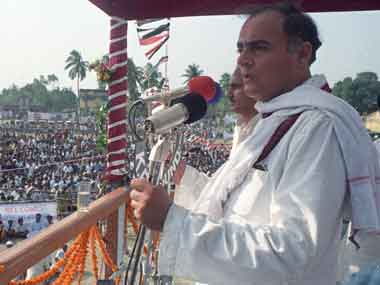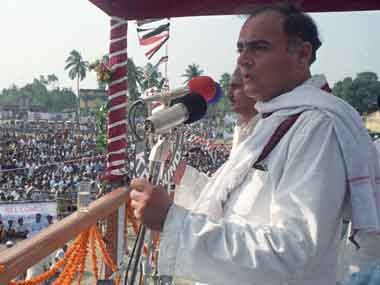If the execution or commutation of a death sentence is not to remain a political football, it is clear that the current process is simply untenable. The NDA government has raised an important question on the issue: can the release of a convict be something that is only between him and the government? If this idea is taken to its logical conclusion, it will balance and bring sanity to the death penalty debate. According to this Times of India report, Solicitor General Ranjit Kumar this week asked the five-judge Supreme Court bench which is hearing the case for freeing the killers of Rajiv Gandhi a pointed question: “Should the relatives of those killed in the blast (that killed Rajiv and 17 others) be not permitted to challenge the Supreme Court’s decision to commute the death sentences of the condemned prisoners? Would it be correct to decide the issues relating to (the) remission granted to prisoners, whose death penalty had been commuted to life imprisonment, be decided merely on an application made by the convict to the government?” [caption id=“attachment_1635163” align=“alignleft” width=“380”]  Former prime minister of India Rajiv Gandhi in a file photo. Reuters[/caption] This is a great question, and, in fact, is the missing link in questions about the death penalty. It is also vital to reducing the element of political arbitrariness in the execution of death penalties, their commutation, et al. In 2012 and 2013, Ajmal Kasab, the Pakistani terrorist who was part of the 26/11 attacks in Mumbai, and Afzal Guru, who was convicted for the December 2011 attack on parliament, were hanged after long delays. The Congress-led UPA, which had been dithering all along, confirmed the executions – one suspects – largely to show it can be tougher than Narendra Modi, then emerging as the real challenger to the UPA. Kasab was executed just ahead of the Gujarat assembly elections, and Afzal Guru a few months after that – just as the BJP was seeking to make Modi the prime ministerial candidate. But then a strange thing happened. Several other convicted assassins – Santhan, Murugan and Perarivalan, all convicted for the killing of Rajiv Gandhi, and Balwant Singh Rajaona, convicted for the assassination of former Punjab CM Beant Singh – were spared the noose. And last year, the Supreme Court commuted the death sentence on Rajiv’s killers on the plea that by delaying their executions so much, an injustice was done to them and their families. It is clear why Kasab and Guru went to the gallows and why Rajaona and the Rajiv’s killers did not – the former did not have strong political backing, while the latter two had political godfathers in the Punjab and Tamil Nadu governments which moved to save them from the gallows (allegedly in deference to public sentiment). And after the Supreme Court commuted the death sentences of Santhan, Murugan and Perarivalan, Tamil Nadu Chief Minister J Jayalalithaa hastily announced a decision to let them go free. This blatantly political act forced the Supreme Court to stay their release last April, and in the process new ideas are coming to the fore — as evidenced by the Solicitor-General’s posers to the Supreme Court bench, which is headed by Chief Justice RM Lodha. Thus far, those who want to abolish the death penalty have been focusing too much attention on the convicts and their families, thinking little about the families of the victims. But if death sentences and their commutation, and even the release of convicts, can be decided without any reference to the real victims — the families of those affected by the acts of killers — how can justice be said to be done ? Revenge and the need for punishment of criminals is not just about the state doing its bit. It is also about bringing closure to the families of the victims as well. In the Rajiv Gandhi assassination case, it was not only Rajiv who got killed in the blast set off by LTTE suicide bomber Dhanu. Seventeen others, including policemen, were killed and scores injured. Their families have suffered. How can the law presume that the agony of a killer’s relatives is greater than that of the families of the people they killed, maimed or injured? If delay in carrying out a death sentence is agony for the former, it is doubly so for the victims. A killer freed may make his family celebrate, but can the families of the victims feel happy about this? The Solicitor-General has done well to bring parity to the process of accepting or rejecting mercy pleas. A formal structure to obtain the inputs of the families of the victims is vital to the process of justice. There are several good and practical reasons why victims’ kin must be brought into the picture. One, it makes for a better form of closure. If the families of the victim are willing to forgive and forget, any commutation will carry more moral weight. If not, they are merely abiding by the court’s final decision. Two, by giving the families a say, many such decisions can be taken out of the ambit of politics. In the Rajiv killers case, while politicians are seeking brownie points by pretending to feel for the convicts and their cause of Tamil Eelam, the real victims – the families of the 17 others killed – were simply left out of this empathy process. Now, if they agreed to the commutation and release, it would be a case of truly forgiving and forgetting. If they don’t agree, it frees the state government from having to prove to the electorate it had sympathy for the killers’ families. Three, in the Afzal Guru case, where the Kashmir sentiment was ignored because it was unimportant in the larger context of Indian politics, the government ended up shamefully hanging him and not even intimating his family in time. Now, Guru has been elevated to a big hero in the Valley. But if the victims of the Parliament attack had formally been brought into the picture, he would have been less of a hero. Guru would, in this case, not just be the victim of arbitrary justice, but paying for his sins. There is a strong case for giving due weightage to the feelings of the families of victims when it comes to taking decisions about the death penalty. PS: A lot of arguments were raised on twitter, subsequent to the publication of this post, about letting the kin of victims have a say in the commutation of a death sentence or the release of convicts. I would like to clarify that I am not calling for the kin to have a say in what penalty should be awarded for a crime, but only about having a say in the post-judicial phase. I believe the kin of the victims should be consulted in case the government wants to commute a sentence. It can still take its own decision, but consulting kin would, according to me, allow the government to take their feelings into account while deciding. A forgive-and-forget attitude from the kin would help a decision in favour of clemency. I am not suggesting a veto to the kin, nor any say for them in deciding the punishment.
The NDA Solicitor-General has asked a five-judge Supreme Court bench how the families of the other victims in the Rajiv Gandhi assassination can be left out of the consultation process for the release of convicts. It is the right question to ask
Advertisement
End of Article
Written by R Jagannathan
R Jagannathan is the Editor-in-Chief of Firstpost. see more


)

)
)
)
)
)
)
)
)



